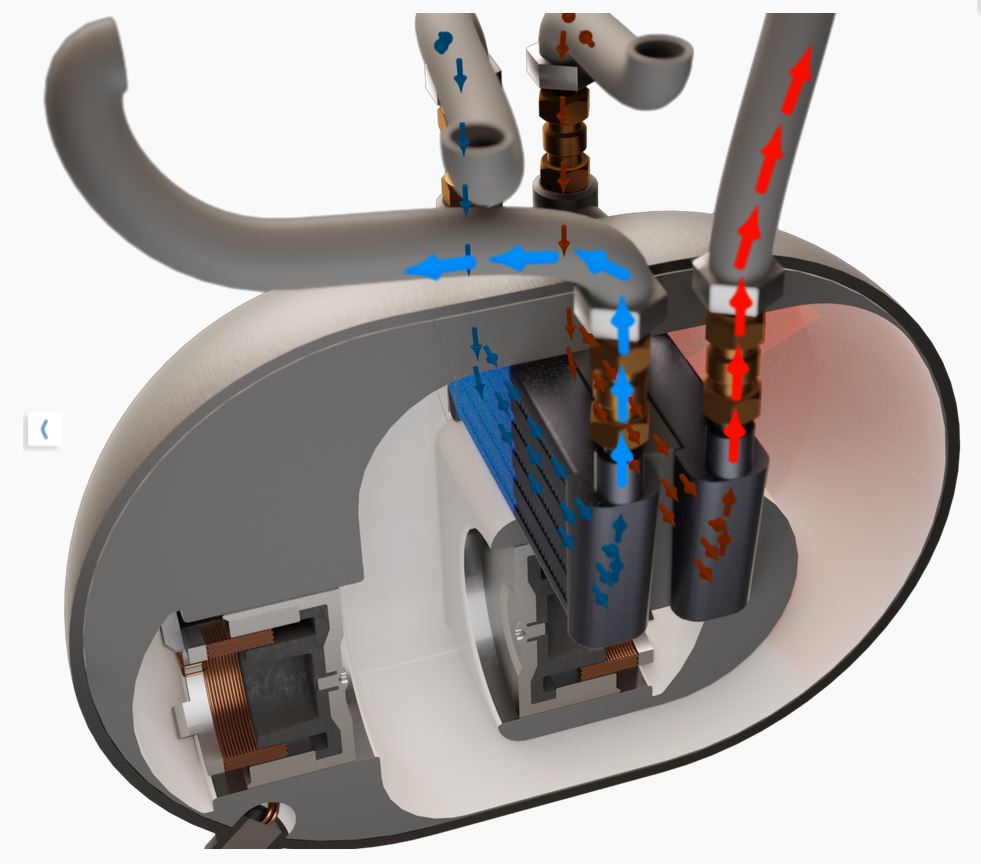The Netherlands Organization for Applied Scientific Research (TNO) and its spinoff, Blue Heart Energy, have developed a 6 kW heat pump that works on acoustic waves and is able to produce both heat and cold air.
“The thermo-acoustic technology is suitable both for residential and industrial applications,” a spokesperson from TNO told pv magazine. “However, the Blue Heart Energy solution focuses exclusively on domestic applications.”
The device measures 55 cm x 55 cm x 55 cm. It can be used in combination with rooftop solar generation.
“The thermo-acoustic heat pump is especially suitable for this given its excellent modulating capability and its temperature flexibility,” the TNO spokesperson said. “When using the thermo-acoustic heat pump in combination with PV, the energy required to drive the heat pump can be taken mainly from the PV-panels, leading to fossil-free heat generation. In the future, smart controls to optimize the efficient use of PV panels and potentially sustainable heat or cold sources are expected.”
The novel heat pump can purportedly reach higher temperatures than existing heat pumps, without the need for refrigerants. It works with two pistons that oscillate at a frequency of 100 Hz in a closed pressure vessel filled with 50 bar helium. It creates an acoustic wave that is able to displace heat from a lower temperature to a higher temperature.
This process takes place in four phases: expansion, displacement, compression, and return displacement.
“During the expansion phase, the temperature of the gas drops, and the gas in the cold heat exchanger absorbs heat,” the scientists explained. “The gas then moves through the regenerator to the warm heat exchanger. Here, the gas is compressed, the temperature rises, and the heat previously absorbed is released into the warm heat exchanger. Finally, the gas moves back, and the cycle is complete.”
They are currently testing the heat pump in an advanced climate chamber in Delft, the Netherlands.
“‘The climate chamber enables us to mimic reality very closely, so performance in the laboratory can give us a good idea of how the device will perform in people’s homes in the future,” they said. “Not only under the static conditions that relate to the standards, but also under dynamic conditions with changing temperatures which come much closer to real-life conditions. In the climate chamber, we can simulate a cold winter’s day, for example, or we can recreate all four seasons in quick succession.”
Blue Heart Energy plans to test the first devices in real houses in 2023.
“There are no moving parts other than the two oscillators, and the device has a service life of more than 15 years,” the research group said.
This content is protected by copyright and may not be reused. If you want to cooperate with us and would like to reuse some of our content, please contact: editors@pv-magazine.com.




Sounds interesting. Please share elements of the performance and energy efficiency. Why is this a good solution?
This is a form of TEG.am I correct? Very interesting read..I am interested in TEG formats and applications involving self sustained heat /cooling abstractions that developed energy…
My thoughts exactly.
Very Interesting.
The most efficient transfer of heat requires a transition of a chemical between liquid and vapor. Without this state change there will be low efficiency.
“two pistons that oscillate in a closed pressure vessel”, so it’s a Stirling engine? But it has no moving parts, but it has oscillating pistons, but no moving parts. Head explodes.
I am tired of reading about new products for residential application without dollar cost comparison to existing.
All the Best. Waiting for the Best Result. I am dealing with other Heat Pump.
We have no clue on the COP of the unit and the variation in function of the outside temperature. I will not get excited before knowing these numbers.
It sounds promessing!
In order to compare with other types of heat pumps we should see the values of SCOP and SEER at different outdoor temperatures.
Also, it is important to know the maintenance cost for 15 years (50 bars is high pressure).
Best wishes to the developers!
Since my house already have 13KW of solar energy and plan to put up more, I like to see what is the result of this concept and hopefully it can replace my electric furnace in a near time future
It’s funny how the efficiency discussion flies out the window when you hookup PV Solar to it.
Its Free!!!! Energy.
I’m wondering where the Helium resource is coming from? With all the Nuclear power plants shutting down we will have shortages of Helium so no more balloons at Parties or Heat for your Home. Nice!
Nuclear plants don’t produce helium. A fusion plant would produce helium as a byproduct of the fusion of hydrogen atoms, however all we have today are fission plants that turn uranium or plutonium isotopes into smaller atoms. Whether or not you have nuclear power plants today has nothing to do with making helium other than providing the electricity to operate helium gas plants.